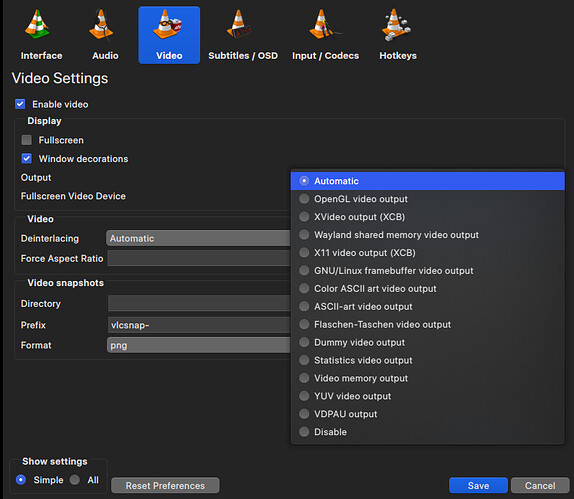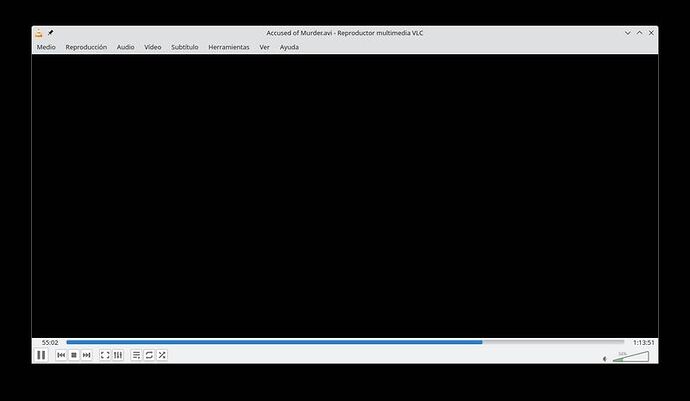Whatever video i try to run on vlc, just blackscreens on me. The audio plays normally, the video track is correct, but the vieo output is black. I suspect this might be some driver error. This issue seems to persist in any video format be it mp4, mkv or even m3u8. mpv player shows no such signs though.
This is what i got after running a video on vlc via terminal:
vlc test.mp4 ✔
VLC media player 3.0.20 Vetinari (revision 3.0.20-0-g6f0d0ab126b)
[0000556d3c7789d0] main libvlc: Running vlc with the default interface. Use 'cvlc' to use vlc without interface.
[00007f19780aa0a0] vaapi generic error: profile(7) is not supported
[00007f1988c07e00] avcodec decoder: Using NVIDIA VDPAU Driver Shared Library 545.29.06 Thu Nov 16 01:46:47 UTC 2023 for hardware decoding
[00007f197c7723a0] glconv_vdpau gl error: glVDPAUMapSurfacesNV failed: 0x502
[00007f197c7723a0] glconv_vdpau gl error: glVDPAUMapSurfacesNV failed: 0x502
and that last error keeps repeating.
Output of: sudo inxi --admin --verbosity=7 --filter --no-host --width:
Kernel: 6.1.69-1-MANJARO arch: x86_64 bits: 64 compiler: gcc v: 13.2.1
clocksource: tsc available: hpet,acpi_pm
parameters: BOOT_IMAGE=/boot/vmlinuz-6.1-x86_64
root=UUID=f48d994e-c928-4379-8442-a607bddaabd8 rw quiet splash
udev.log_priority=3
Desktop: KDE Plasma v: 5.27.10 tk: Qt v: 5.15.11 info: latte-dock
wm: kwin_wayland dm: SDDM Distro: Manjaro Linux base: Arch Linux
Machine:
Type: Laptop System: ASUSTeK product: ASUS TUF Gaming A15 FA506IH_FA506IH
v: 1.0 serial: <filter>
Mobo: ASUSTeK model: FA506IH v: 1.0 serial: <filter>
UEFI: American Megatrends v: FA506IH.316 date: 03/12/2021
Battery:
ID-1: BAT1 charge: 33.3 Wh (100.0%) condition: 33.3/48.1 Wh (69.2%)
volts: 12.4 min: 11.7 model: ASUS A32-K55 type: Li-ion serial: N/A
status: full
Memory:
System RAM: total: 16 GiB available: 15.05 GiB used: 10.7 GiB (71.1%)
Array-1: capacity: 32 GiB slots: 2 modules: 2 EC: None
max-module-size: 16 GiB note: est.
Device-1: DIMM 0 type: DDR4 detail: synchronous unbuffered (unregistered)
size: 8 GiB speed: 3200 MT/s volts: curr: 1.2 min: 1.2 max: 1.2 width (bits):
data: 64 total: 64 manufacturer: Samsung part-no: M471A1K43DB1-CWE
serial: <filter>
Device-2: DIMM 0 type: DDR4 detail: synchronous unbuffered (unregistered)
size: 8 GiB speed: 3200 MT/s volts: curr: 1.2 min: 1.2 max: 1.2 width (bits):
data: 64 total: 64 manufacturer: Samsung part-no: M471A1K43DB1-CWE
serial: <filter>
CPU:
Info: model: AMD Ryzen 5 4600H with Radeon Graphics socket: FP6 bits: 64
type: MT MCP arch: Zen 2 gen: 3 level: v3 note: check built: 2020-22
process: TSMC n7 (7nm) family: 0x17 (23) model-id: 0x60 (96) stepping: 1
microcode: 0x8600104
Topology: cpus: 1x cores: 6 tpc: 2 threads: 12 smt: enabled cache:
L1: 384 KiB desc: d-6x32 KiB; i-6x32 KiB L2: 3 MiB desc: 6x512 KiB L3: 8 MiB
desc: 2x4 MiB
Speed (MHz): avg: 1666 high: 3000 min/max: 1400/3000 boost: enabled
base/boost: 3000/4000 scaling: driver: acpi-cpufreq governor: schedutil
volts: 1.2 V ext-clock: 100 MHz cores: 1: 1400 2: 1400 3: 1400 4: 1400
5: 3000 6: 1400 7: 1400 8: 1400 9: 1400 10: 1400 11: 3000 12: 1400
bogomips: 71898
Flags: 3dnowprefetch abm adx aes aperfmperf apic arat avic avx avx2 bmi1
bmi2 bpext cat_l3 cdp_l3 clflush clflushopt clwb clzero cmov cmp_legacy
constant_tsc cpb cppc cpuid cqm cqm_llc cqm_mbm_local cqm_mbm_total
cqm_occup_llc cr8_legacy cx16 cx8 de decodeassists extapic extd_apicid
f16c flushbyasid fma fpu fsgsbase fxsr fxsr_opt ht hw_pstate ibpb ibrs ibs
irperf lahf_lm lbrv lm mba mca mce misalignsse mmx mmxext monitor movbe
msr mtrr mwaitx nonstop_tsc nopl npt nrip_save nx osvw overflow_recov pae
pat pausefilter pclmulqdq pdpe1gb perfctr_core perfctr_llc perfctr_nb
pfthreshold pge pni popcnt pse pse36 rapl rdpid rdpru rdrand rdseed rdt_a
rdtscp rep_good sep sev sev_es sha_ni skinit smap smca smep ssbd sse sse2
sse4_1 sse4_2 sse4a ssse3 stibp succor svm svm_lock syscall tce topoext
tsc tsc_scale umip v_spec_ctrl v_vmsave_vmload vgif vmcb_clean vme vmmcall
wbnoinvd wdt xgetbv1 xsave xsavec xsaveerptr xsaveopt
Vulnerabilities:
Type: gather_data_sampling status: Not affected
Type: itlb_multihit status: Not affected
Type: l1tf status: Not affected
Type: mds status: Not affected
Type: meltdown status: Not affected
Type: mmio_stale_data status: Not affected
Type: retbleed mitigation: untrained return thunk; SMT enabled with STIBP
protection
Type: spec_rstack_overflow mitigation: safe RET
Type: spec_store_bypass mitigation: Speculative Store Bypass disabled via
prctl
Type: spectre_v1 mitigation: usercopy/swapgs barriers and __user pointer
sanitization
Type: spectre_v2 mitigation: Retpolines, IBPB: conditional, STIBP:
always-on, RSB filling, PBRSB-eIBRS: Not affected
Type: srbds status: Not affected
Type: tsx_async_abort status: Not affected
Graphics:
Device-1: NVIDIA TU117M [GeForce GTX 1650 Mobile / Max-Q] vendor: ASUSTeK
driver: nvidia v: 545.29.06 alternate: nouveau,nvidia_drm non-free: 545.xx+
status: current (as of 2023-11; EOL~2026-12-xx) arch: Turing code: TUxxx
process: TSMC 12nm FF built: 2018-2022 pcie: gen: 1 speed: 2.5 GT/s
lanes: 8 link-max: gen: 3 speed: 8 GT/s lanes: 16 bus-ID: 01:00.0
chip-ID: 10de:1f99 class-ID: 0300
Device-2: AMD Renoir [Radeon RX Vega 6 ] vendor: ASUSTeK driver: amdgpu
v: kernel arch: GCN-5 code: Vega process: GF 14nm built: 2017-20 pcie: gen: 4
speed: 16 GT/s lanes: 16 ports: active: eDP-1 empty: HDMI-A-1
bus-ID: 05:00.0 chip-ID: 1002:1636 class-ID: 0300 temp: 43.0 C
Device-3: IMC Networks USB2.0 HD UVC WebCam driver: uvcvideo type: USB
rev: 2.0 speed: 480 Mb/s lanes: 1 mode: 2.0 bus-ID: 1-4:2 chip-ID: 13d3:56a2
class-ID: 0e02 serial: <filter>
Display: server: X.Org v: 23.2.3 with: Xwayland v: 23.2.3
compositor: kwin_wayland driver: X: loaded: amdgpu,nvidia
unloaded: modesetting,nouveau alternate: fbdev,nv,vesa dri: radeonsi
gpu: amdgpu display-ID: :1 screens: 1
Screen-1: 0 s-res: 1920x1080 s-dpi: 96 s-size: 508x286mm (20.00x11.26")
s-diag: 583mm (22.95")
Monitor-1: eDP-1 model: Najing CEC Panda 0x002d built: 2018 res: 1920x1080
hz: 60 dpi: 143 gamma: 1.2 size: 340x190mm (13.39x7.48") diag: 395mm (15.5")
ratio: 16:9 modes: max: 1920x1080 min: 640x480
API: EGL v: 1.5 hw: drv: nvidia drv: amd radeonsi platforms: device: 0
drv: nvidia device: 1 drv: radeonsi device: 3 drv: swrast gbm: drv: radeonsi
surfaceless: drv: nvidia x11: drv: radeonsi inactive: wayland,device-2
API: OpenGL v: 4.6.0 compat-v: 4.5 vendor: amd mesa v: 23.1.9-manjaro1.1
glx-v: 1.4 direct-render: yes renderer: AMD Radeon Graphics (renoir LLVM
16.0.6 DRM 3.49 6.1.69-1-MANJARO) device-ID: 1002:1636 memory: 500 MiB
unified: no
API: Vulkan v: 1.3.274 layers: 2 device: 0 type: discrete-gpu
name: NVIDIA GeForce GTX 1650 driver: nvidia v: 545.29.06
device-ID: 10de:1f99 surfaces: xcb,xlib device: 1 type: integrated-gpu
name: AMD Radeon Graphics (RADV RENOIR) driver: mesa radv
v: 23.1.9-manjaro1.1 device-ID: 1002:1636 surfaces: xcb,xlib
Audio:
Device-1: NVIDIA vendor: ASUSTeK driver: snd_hda_intel v: kernel pcie: gen: 3
speed: 8 GT/s lanes: 8 link-max: lanes: 16 bus-ID: 01:00.1 chip-ID: 10de:10fa
class-ID: 0403
Device-2: AMD Renoir Radeon High Definition Audio vendor: ASUSTeK
driver: snd_hda_intel v: kernel pcie: gen: 4 speed: 16 GT/s lanes: 16
bus-ID: 05:00.1 chip-ID: 1002:1637 class-ID: 0403
Device-3: AMD ACP/ACP3X/ACP6x Audio Coprocessor driver: N/A
alternate: snd_pci_acp3x, snd_rn_pci_acp3x, snd_pci_acp5x, snd_pci_acp6x,
snd_acp_pci, snd_rpl_pci_acp6x, snd_pci_ps, snd_sof_amd_renoir,
snd_sof_amd_rembrandt pcie: gen: 4 speed: 16 GT/s lanes: 16 bus-ID: 05:00.5
chip-ID: 1022:15e2 class-ID: 0480
Device-4: AMD Family 17h/19h HD Audio vendor: ASUSTeK driver: snd_hda_intel
v: kernel pcie: gen: 4 speed: 16 GT/s lanes: 16 bus-ID: 05:00.6
chip-ID: 1022:15e3 class-ID: 0403
API: ALSA v: k6.1.69-1-MANJARO status: kernel-api with: aoss
type: oss-emulator tools: alsactl,alsamixer,amixer
Server-1: sndiod v: N/A status: off tools: aucat,midicat,sndioctl
Server-2: JACK v: 1.9.22 status: off tools: jack_control,qjackctl
Server-3: PipeWire v: 1.0.0 status: n/a (root, process) with:
1: pipewire-pulse status: active 2: pipewire-media-session status: active
3: pipewire-alsa type: plugin tools: pactl,pw-cat,pw-cli
Network:
Device-1: Realtek RTL8111/8168/8411 PCI Express Gigabit Ethernet
vendor: ASUSTeK driver: r8169 v: kernel pcie: gen: 1 speed: 2.5 GT/s lanes: 1
port: e000 bus-ID: 02:00.0 chip-ID: 10ec:8168 class-ID: 0200
IF: enp2s0 state: down mac: <filter>
Device-2: Realtek RTL8822CE 802.11ac PCIe Wireless Network Adapter
vendor: Lite-On driver: rtw_8822ce v: N/A modules: rtw88_8822ce pcie: gen: 1
speed: 2.5 GT/s lanes: 1 port: d000 bus-ID: 03:00.0 chip-ID: 10ec:c822
class-ID: 0280
IF: wlp3s0 state: up mac: <filter>
IP v4: <filter> type: dynamic noprefixroute scope: global
broadcast: <filter>
IP v6: <filter> type: noprefixroute scope: link
WAN IP: <filter>
Bluetooth:
Device-1: Lite-On Bluetooth Radio driver: btusb v: 0.8 type: USB rev: 1.0
speed: 12 Mb/s lanes: 1 mode: 1.1 bus-ID: 3-1:2 chip-ID: 04ca:4005
class-ID: e001 serial: <filter>
Report: rfkill ID: hci0 rfk-id: 0 state: down bt-service: enabled,running
rfk-block: hardware: no software: yes address: see --recommends
Logical:
Message: No logical block device data found.
RAID:
Message: No RAID data found.
Drives:
Local Storage: total: 476.94 GiB used: 151.58 GiB (31.8%)
ID-1: /dev/nvme0n1 maj-min: 259:0 vendor: Micron model: 2210 MTFDHBA512QFD
size: 476.94 GiB block-size: physical: 512 B logical: 512 B speed: 31.6 Gb/s
lanes: 4 tech: SSD serial: <filter> fw-rev: P6MA001 temp: 36.9 C
scheme: GPT
SMART: yes health: PASSED on: 366d 6h cycles: 2,742
read-units: 64,446,552 [32.9 TB] written-units: 52,326,072 [26.7 TB]
Message: No optical or floppy data found.
Partition:
ID-1: / raw-size: 273.44 GiB size: 268.08 GiB (98.04%)
used: 151.58 GiB (56.5%) fs: ext4 block-size: 4096 B dev: /dev/nvme0n1p5
maj-min: 259:5 label: N/A uuid: f48d994e-c928-4379-8442-a607bddaabd8
Swap:
Alert: No swap data was found.
Unmounted:
ID-1: /dev/nvme0n1p1 maj-min: 259:1 size: 100 MiB fs: vfat label: N/A
uuid: E465-6F98
ID-2: /dev/nvme0n1p2 maj-min: 259:2 size: 16 MiB fs: N/A label: N/A
uuid: N/A
ID-3: /dev/nvme0n1p3 maj-min: 259:3 size: 202.73 GiB fs: ntfs label: N/A
uuid: 648069A180697B06
ID-4: /dev/nvme0n1p4 maj-min: 259:4 size: 674 MiB fs: ntfs label: N/A
uuid: B69804FD9804BE3D
USB:
Hub-1: 1-0:1 info: hi-speed hub with single TT ports: 4 rev: 2.0
speed: 480 Mb/s (57.2 MiB/s) lanes: 1 mode: 2.0 chip-ID: 1d6b:0002
class-ID: 0900
Device-1: 1-4:2 info: IMC Networks USB2.0 HD UVC WebCam type: video
driver: uvcvideo interfaces: 2 rev: 2.0 speed: 480 Mb/s (57.2 MiB/s) lanes: 1
mode: 2.0 power: 500mA chip-ID: 13d3:56a2 class-ID: 0e02 serial: <filter>
Hub-2: 2-0:1 info: super-speed hub ports: 2 rev: 3.1
speed: 10 Gb/s (1.16 GiB/s) lanes: 1 mode: 3.2 gen-2x1 chip-ID: 1d6b:0003
class-ID: 0900
Hub-3: 3-0:1 info: hi-speed hub with single TT ports: 4 rev: 2.0
speed: 480 Mb/s (57.2 MiB/s) lanes: 1 mode: 2.0 chip-ID: 1d6b:0002
class-ID: 0900
Device-1: 3-1:2 info: Lite-On Bluetooth Radio type: bluetooth driver: btusb
interfaces: 2 rev: 1.0 speed: 12 Mb/s (1.4 MiB/s) lanes: 1 mode: 1.1
power: 500mA chip-ID: 04ca:4005 class-ID: e001 serial: <filter>
Hub-4: 4-0:1 info: super-speed hub ports: 2 rev: 3.1
speed: 10 Gb/s (1.16 GiB/s) lanes: 1 mode: 3.2 gen-2x1 chip-ID: 1d6b:0003
class-ID: 0900
Sensors:
System Temperatures: cpu: 50.2 C mobo: N/A gpu: amdgpu temp: 44.0 C
Fan Speeds (rpm): cpu: 2500
Info:
Processes: 555 Uptime: 4h 18m wakeups: 0 Init: systemd v: 254
default: graphical tool: systemctl Compilers: gcc: 13.2.1 clang: 16.0.6
Packages: 2338 pm: pacman pkgs: 2287 libs: 480 tools: octopi,pamac,yay
pm: flatpak pkgs: 51 Shell: Sudo (sudo) v: 1.9.15p4 default: Bash v: 5.2.21
running-in: yakuake inxi: 3.3.31```


